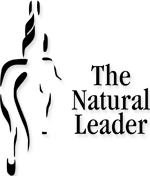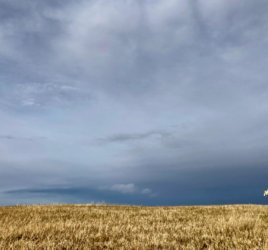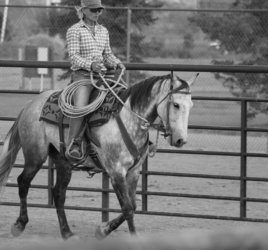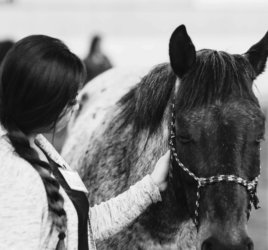Terri Holowath attained the title in 2015, winning every event she and her horse Jade (Red Hot Jade) entered in the National Reined Cow Horse Association Tour (NRCHA). Not bad for a part-time rider in the non-pro two rein working cow horse category. Her other full-time position, Managing Partner/CEO with Catalyst LLP in south Calgary, Alberta.
TH – I told myself “I wanted to find out what people who don’t have horses do with all their time.” I didn’t necessarily accomplish that goal because I still rode a lot. I did some renovations and decorating but I got bored with that, so got back into riding.My husband Bart and I do the National Reined Cow horse Association tour every year traveling to Fort Worth in February; Las Vegas in March, we go to California in June and then in October we’re back to Fort Worth with a stop in Idaho on the way home.
One of the great things about my job is as long as I have internet and a cell phone I can work from anywhere. I can remote access the system in the office so it’s pretty much like I’m sitting at my desk in the office. It’s a job that offers a lot of flexibility so it’s both a great thing and also the downside. The only time I really leave it is when I’m on the back of the horse.
NL – What have horses taught you, about who you are as a leader in the workplace?

Terri Holowath – Pickachicklet 2014
TH – There are a couple of things. Relationships are a big part of it. I have what I would call a deep relationship with all the horses I’ve shown. I had a strong relationship with Pickachicklet, a horse I retired a couple of years ago. It’s the same with Jade we connected and bonded. He takes care of me and I take care of him.
I guess it’s the same with my business partners the office. I have 9 business partners I work with on a daily basis and we all share a deep bond. We are good friends and have a great working relationship. Same with my clients. I’ve had clients who have been with me for many years. They trust me and I take care of them and we have a solid relationship. I think that is a big part of it with both horses and people.
The other thing I’ve learned is trust and boundaries. When you get into that show pen have to trust the horse, especially these performance horses they have a lot of pride and they are well trained – you have to trust they will do there jobs and you have to let them do it.
I find that Type A high performing horses are the same as Type A high performing people, you have to trust them and they need well defined boundaries, because they hate making mistakes. When you stay out of their way and they know what is expected they do their job so much better.
Human or horse, high performers have high expectations of themselves and hate making mistakes. If you let them know they’ve done something wrong, there are some horses that really will worry so you can’t be too hard on them. Same with people that beat themselves up when they make a mistake. You have to be careful and not be too hard on them.
———
NL – When you meet someone who is a high performer? What are some things you’ve learned to help them find the good in whatever the mistake was?
Sometimes it backfires on me too. If I don’t let the horse know in a timely way when we’re practicing and then I let them know in the show pen, then they really get worried.
NL – What’s your strategy – to catch yourself when you are being the helper versus correcting or bringing something to someone’s attention?
TH – I have to recognize it’s a learning opportunity. If I fix something someone’s done without telling them, I’ve denied them a learning opportunity. It’s the same with my horses, I have to remind myself I’m not being the helper, I have to stop worrying that it’s bothering them. It’s recognizing I’m denying them the learning opportunity.
Riding is good for the soul. I know that phrase is overused but I don’t know what I would do as a leader or how I’d manage the stress in my life if I didn’t have the horses in my life.
NL – How do you help others see the importance of clearing their head when they get stressed?
We have a lot of millennials in the office who add the typical generational difference, in particular a demand for balance. When they see me traveling to Ft Worth and California and being able to balance my career with what I love. I believe that sends a good message about this being a pretty good career to be in.
A truly balanced lifestyle is something that is part of the culture of our office. I always say I work hard at the office because I want to be able to get home and ride my horses and I want to hang out with them.
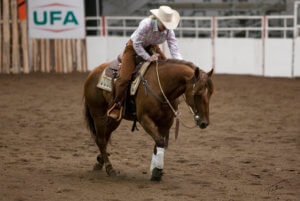 NL – Is the balanced life style then, one of the most important things that horses have taught you?
NL – Is the balanced life style then, one of the most important things that horses have taught you?
TH – Yes, that is a good observation. That is exactly what horses have taught me. The accounting profession has a bad rap for being a workaholic industry. Absolutely horses have taught me the importance of balance.
NL – Have you been able to achieve that balance through time or is it something you have been able to do all along?
TH – I’ve been with the same firm 25 years, I’ve been able to do it because it’s important to me. Early in my career I was trying to prove myself and made partner in 2000. It was about 2003-4 that I decided I had to get back to who I was, that I had to get back to what I grew up with.
It was always my intention and goal to get land and get back to horses. Then I realized if I do this right I can be good at both my career and horses. I found a way and I made sure we had the technology to support remote work. I’d say I’ve done an ok job of balancing both as a managing partner and becoming world champion. That’s no small achievement.
——-
NL – I’ve met people who want success to happen faster than it is. Just because you wanted to do it, did it just happen?
NL – If there was one thing that others could learn from working with a horse.
Like I said earlier I wanted to find out what people do with their time without horses. Our vacations are always working but it’s around the horse so they are relaxing and fun too. They help me keep my sanity.
To explore how a day with horses can complement your Leadership Training programs Nancy would love to hear from you.
